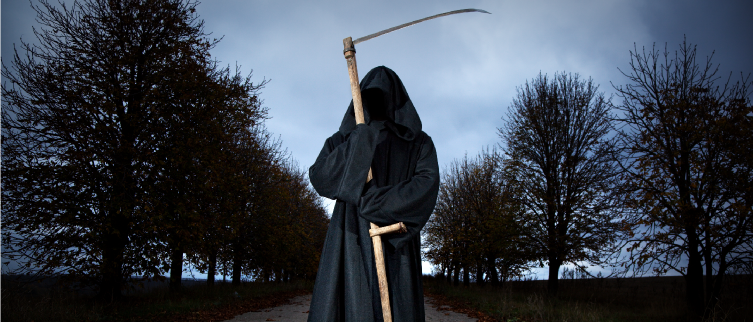
Unexpected Visits from the Grim Reaper: Make Sure Affairs Are in Order When Divorcing
Death and divorce have an interesting relationship in Georgia. It’s important to know their dynamics … or your family or beneficiaries might pay an unexpected price!
A typical Domestic Relations Standing Order, an order filed with a divorce automatically or in most cases, provides that neither party to a divorce may sell, encumber, trade, contract to sell or otherwise dispose of or remove marital property from the jurisdiction of the court unless it is in the ‘ordinary course of business.’
But what if a spouse who is a party to a divorce decides to change his or her beneficiary designation on a life insurance policy or a retirement account, or even change his or her will? Georgia is called an ‘equitable division’ state with respect to divorce, meaning that marital property is divided fairly, and not necessarily evenly.
 The twist is that, in Georgia, probate law doesn’t follow the principle of equitable division. The Official Code of Georgia, section 53-4-1 provides that a Testator may make any disposition of property that is not inconsistent with the laws or contrary to public policy and may give all the property to strangers to the exclusion of the testator’s spouse or descendants.
The twist is that, in Georgia, probate law doesn’t follow the principle of equitable division. The Official Code of Georgia, section 53-4-1 provides that a Testator may make any disposition of property that is not inconsistent with the laws or contrary to public policy and may give all the property to strangers to the exclusion of the testator’s spouse or descendants.
Most courts have concluded that changing beneficiaries to a life insurance policy is not ‘property’ and is merely an expectation of property contingent upon the death of the policy holder. Therefore, it is not a transfer or conveyance of property since it has no real value until the insured is dead.
The same argument can be had with a Last Will and Testament.
- The changing of a person’s Will does not transfer or have any other legal effect on the Testator’s assets since it does not transfer or dispose of a person’s assets.
- Further, unless there is a Consent Order to the contrary, parties to a divorce routinely revise their Wills to prevent the other spouse from receiving assets that the Testator does not want to convey in the event of premature death.
I have been involved in at least three cases where the opposing side has died prior to the granting of a Final Judgment and Decree of Divorce, and in neither case had the decedent changed his or her Will, so the surviving party ended up receiving the entire marital estate. This would not have happened had decedent survived the divorce and subsequently revised their Will and beneficiary designations.
Further, in the event a Will is not changed, divorce will not automatically revoke beneficiary designations or Will provisions in Georgia. That means it’s important that, absent an Order to the contrary, one’s Will and beneficiary designations should be changed immediately after a Divorce Decree is issued.
